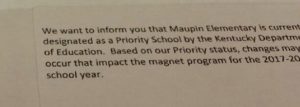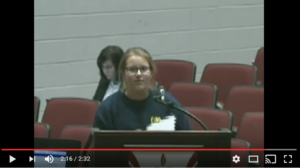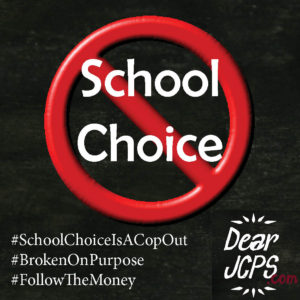This email was sent to Kentucky Board of Education Members. Their email addresses are:
grboyd@bigsandybb.com,
cundifffarms1979@gmail.com,
RFGimmel@atlasmachine.com,
sdhiv1234@gmail.com,
gary.houchens@wku.edu,
alesag.johnson@gmail.com,
Robert.King@ky.gov,
rlmarcum22@gmail.com,
nawannap@aol.com,
ceemore1@gmail.com,
wtwyman@scrtc.com,
marygwenw@cflouisville.org
Dear KBE Members,
As a parent of a recent JCPS graduate from one of our district’s Cohort 1 “priority” schools, I implore you to exercise extreme caution when vote tomorrow to recommend charter schools, and if you do decide to do so, be equally judicious with which elements you can support.
One of the things that makes Kentucky schools special is its emphasis on local control, as exemplified in the innovative decision under KERA to provide SBDM power to local schools. However, the conversation revolving around helping these high poverty gap students via way of charters is invalid if you take into account that my son’s priority school lost its SBDM powers 5 years ago when it entered into priority status.
Another thing that no one seems to be able to genuinely answer is how “school choice” will solve our problems in closing achievement gaps. JCPS is already a district of choice. This choice, combined with overemphasis on high stakes test scores, has been devastating to our students in poverty, who don’t have the same abilities to navigate the system and overcome the hurdles we put in front of them. Our student assignment map that discriminates against our most vulnerable citizens is just one of many examples. There is no sense of community behind my son’s school because they backfill the students who attend there from other communities. Perhaps you should know more about hurdles like these before we assume that they just need MORE choices. Competition has not been proven to improve outcomes in Jefferson County. We need more reasons to work collaboratively instead. Let’s work to make our existing schools better before we throw more variability and competition into the mix.
Speaking of local control, our local school board is should have the final say as to which charters will be permitted in our community. They are democratically elected and have the ability to garner feedback from their constituents about the proposed schools and whether or not the charter proposals and the underlying assumptions, hold water when it comes to how they will address the needs of the students in our community.
Perhaps instead of looking at charters as a solution for persistently low achieving schools, we should look at ways to remove some of the handcuffs we’ve placed upon them. I’m happy to share a litany of these items, should you be interested, in addition to a few I hinted at above. No, these problems are not solved by simply introducing charters as a way of “working around” the system. When we have a leaky house, we must fix the roof, not build a new house down the street.
Furthermore, should charter schools move forward, I would like to reiterate the following provisions that should be a requirement in any charter school legislation in the state of Kentucky:
• SBDMs need to be in every publicly funded school, both public and charter (especially priority schools!)
• The local school board, which is democratically elected by the community it serves, should serve as authorizers
• Non profit. Truly non profit not an arm of for profit company
Should not take tax dollars from existing schools. (Since this year is not a budget year, making funding a sticking point could buy us time.)
• Not closing schools just because they are low performing. Need latitude to serve special needs, at risk, etc without being held to same standards as a school like Manual.
• Remove the unhealthy fixation we have on high stakes testing for all schools, public and charter, but finding less intrusive accountability measures, such as sampling and dashboards, and even self reporting of portfolios of accomplishments
• Schools must be open to all, and should not have ability to refuse applicants or weed out. Barriers to entry already create self selection bias. How will that be eliminated?
• Must provide transportation and free and reduced lunch the same way public schools do.
• No use of public funds for religious schools. (No vouchers for St X, for example.)
• Accountability and transparency is a must. Open board meetings, open records, published minutes, budgets and salaries of all employees, contractors and operators
• There needs to be a minimum enrollment in a charter before it can be funded, demonstrating community need and support.
• There should be a limit to the number of new charter schools opened per year.
• There should be safeguards in place to prevent taking resources from public schools to fund the charters. One of the reasons public schools are currently failing is due to lack of supports and resources. Stripping away funding, or even “high performing” students, or highly involved families, from the mix, creates even greater burdens and hardships on the schools that stay.
• There needs to be equitable access to quality schools in every neighborhood. Closing low performing schools is not an option if there are no other schools in the vicinity.
• We need to treat our teachers with respect and support if we wish to attract quality educators. The idea that we can work them more hours for less money is going in the wrong direction and will see less than qualified individuals with higher turnover than we are currently experiencing in public schools. This is a fallacy with no evidence to support it.
• JCPS is already district of choice. You must demonstrate, without a doubt , not just from selective evidence, that “school choice” does more to fix existing problems. Proponents must provide conclusive evidence before we move forward with implementing a solution that doesn’t fix an existing problem, but only layers on more complexities.
This is a quick list I threw together in the hopes that you will have a chance to review it before you vote tomorrow.
I found the presentations at the work session last week to be one sided. They did not provide an opportunity to cross-examine the evidence by those of us who represent the more cautious approach to charter school implementation. What were the unique qualities of each of the success stories and what made them a success? What specific laws did they implement, which we could we emulate, to make sure we have the same successes? Claims that Nashville was a success story was quickly discredited by Tweets from school board members in Nashville. Arguments that charters serve gap students in urban areas has been disproven time and again by other research groups. Parents, teachers, community leaders, including NAACP, have made it clear that charters are doing more harm than good in many of the communities all over the country where they have entered. THESE VOICES CANNOT BE DENIED! Perhaps it is due to one or two factors that good legislation can and will prevent, but the information presented to the board at the work session was unclear what those specific items are, and therefore you do not have conclusive enough evidence at this time to justify forcing us to implement unproven charter schools in our major cities. WE DON’T WANT THEM! No one has been able to demonstrate to me that any version of charter schools will magically address the needs of the students attending my son’s school and schools like them. Since they represent our district’s most vulnerable, don’t we really need to come up with the best plan for them, regardless if it’s introducing charters or fixing existing schools, before we move forward with any plan?
Please help those who are doing the work at the ground level dig into the ways we can stop failing our most vulnerable students in the Commonwealth BEFORE moving forward with some fancy new idea, which will only create a distraction and drain on resources and energy. I look forward to continuing the conversation. We have work to do.
Gay Adelmann






